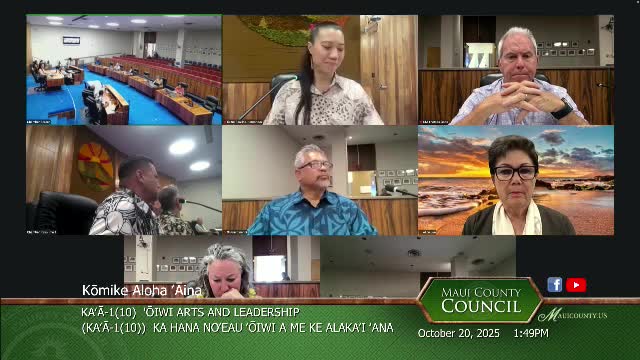Hawaiian Council, cast preview Hi'iaka and discuss economic sovereignty, Lahaina theater preservation at Maui County meeting
Get AI-powered insights, summaries, and transcripts
Subscribe
Summary
Kuhio Luis, president and CEO of the Hawaiian Council, and Michael Jakowitz, producer and founder of Wizend Productions, appeared before the Maui County Council on Oct. 20 to brief members about the Hawaiian Council’s recent annual convention and a preview of the stage production The Epic Tale of Hi'iaka.
Kuhio Luis, president and CEO of the Hawaiian Council, and Michael Jakowitz, producer and founder of Wizend Productions, appeared before the Maui County Council on Oct. 20 to brief members about the Hawaiian Council’s recent annual convention and a preview of the stage production The Epic Tale of Hi'iaka.
The presentation and public testimony emphasized cultural representation, the production’s reception and broader economic development questions raised at the convention, including gaming, tribal economic models and efforts to preserve performance venues in Lahaina.
Kuhio Luis told the council the Hawaiian Council holds its convention on the continent to reconnect with the Hawaiian diaspora, saying, “It was very exciting to be able to strengthen bonds with fellow native people.” He said the council gathered more than 1,300 Hawaiians at the 24th annual convention in Tulalip, Washington, and used a multi-state media effort to feature Hawaiians living off-island.
Michael Jakowitz described the genesis of Hi'iaka and his intent to bring Hawaiian stories to broader audiences. “This is our Lord of the Rings. This is our epic story,” Jakowitz said, recounting how Hawaiian advisors and Broadway collaborators developed the musical. He said a 45-minute excerpt was shown at the convention and that the full show is planned for future runs, including a staged premiere next year.
Cast members who testified described the production as a healing and identity-affirming experience. Star Kalihiki Kalani Kalahiki, who identified herself as a cast member, said the response to the show had been profound: “I believe in the power of Aloha and of music, to save the world.” Nora, another cast member, summarized the effect of theater on community: "Theater heals."
Council members and testifiers also brought up several topics the convention covered. Luis said the convention addressed public-land trust issues, gaming and the Mauna Kea situation. Member Sanensi noted data-collection work presented at the convention and said Department of Hawaiian Homes staff will deliver 96 paper leases to East Maui recipients in a future outreach visit.
Members asked about lessons from tribal gaming in the Pacific Northwest. Luis said Tulalip’s model was discussed because of its incremental build-out from small gaming operations to larger facilities and because Washington has a sizable Hawaiian population. He described gaming as a potential economic-development tool but stressed the convention’s role was to convene discussions, not adopt policy: “It was allowing people to have conversations and not for us to take a position,” he said.
Luis outlined Hawaiian Council economic programs he said aim to raise household incomes and support local businesses: workforce certifications (for example, trades licensing), the Kuhana business accelerator and a loan fund/CDFI. He said the council’s marketplaces and business programs have moved more than $5,000,000 in product sales and that the organization makes nonconventional loans and grants to incubate businesses.
Several council members urged attention to Lahaina’s recovery and cultural assets. Michael Jakowitz and Luis both recommended preserving the Ulalena Theater in Lahaina as a potential venue for Hawaiian storytelling and local economic activity. Luis said redevelopment plans in Lahaina could place the theater and adjacent Foodland at risk and identified the theater’s owner and county recovery contacts by name in the discussion.
Council members and testifiers listed short- and medium-term actions to support cultural and economic recovery: bringing performance programming back to Lahaina, advancing workforce development and convening partners for festivals and pop-up markets. Chair Rollins Fernandez closed the item by saying, “If there are no any objections, we’ll defer this item,” and the committee accepted recent testimony into the record and deferred further action on the presentation.
The item was a presentation (no legislative action scheduled); the council recorded oral testimony from multiple cast members and attendees and discussed follow-up priorities including venue preservation, small-business support and coordinating with recovery offices and state programs.
Votes at a glance: none (presentation and public testimony only; item deferred).
